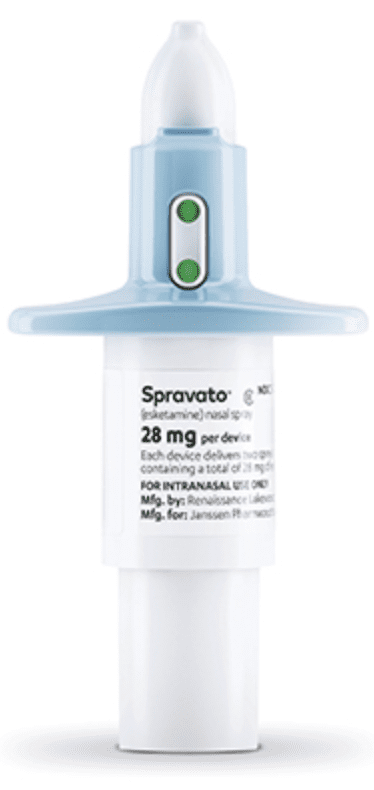Spravato and Alcohol/Food Interactions
There are 2 alcohol/food/lifestyle interactions with Spravato (esketamine).
Esketamine Food/Lifestyle
Moderate Food Interaction
GENERALLY AVOID: Concomitant use of esketamine with central nervous system (CNS) depressants such as alcohol may increase sedation and impairment of attention, judgment, thinking, reaction speed, and psychomotor skills.
ADJUST DOSING INTERVAL: Nausea and vomiting may occur following intranasal administration of esketamine. In clinical studies, nausea and vomiting were reported in approximately 25% and 10% of esketamine-treated patients, respectively.
MANAGEMENT: Patients receiving esketamine should be advised to avoid or limit the consumption of alcohol. In addition, to help prevent nausea and vomiting, patients should be advised not to eat for at least 2 hours before intranasal administration of esketamine and not to drink liquids for at least 30 minutes prior to administration.
References (2)
- Cerner Multum, Inc. "Australian Product Information."
- (2019) "Product Information. Spravato (esketamine)." Janssen Pharmaceuticals
Switch to consumer interaction data
Esketamine High Blood Pressure (Hypertension)
Major Potential Hazard, Moderate plausibility
esketamine - high blood pressure
Esketamine causes an increase in systolic and/or diastolic blood pressure at all recommended doses. The increase peaks approximately 40 minutes after administration of esketamine, and lasts for about 4 hours. Blood pressure should be monitored prior and after administration. If baseline blood pressure is elevated before administering (e.g., >140 mmHg systolic, >90 mmHg diastolic), consider the risks of short term increases in blood pressure and benefit of treatment in patients with treatment- resistant depression (TRD). Do not administer esketamine if an increase in blood pressure or intracranial pressure poses a serious risk. Esketamine is contraindicated in patients with aneurysmal vascular disease (including thoracic and abdominal aorta, intracranial, and peripheral arterial vessels), arteriovenous malformations, or a history of intracerebral hemorrhage.
References (1)
- (2019) "Product Information. Spravato (esketamine)." Janssen Pharmaceuticals
Switch to consumer interaction data
Spravato drug interactions
There are 296 drug interactions with Spravato (esketamine).
Spravato disease interactions
There are 4 disease interactions with Spravato (esketamine) which include:
More about Spravato (esketamine)
- Spravato consumer information
- Check interactions
- Compare alternatives
- Pricing & coupons
- Reviews (127)
- Drug images
- Side effects
- Dosage information
- During pregnancy
- FDA approval history
- Drug class: miscellaneous antidepressants
- Breastfeeding
- En español
Related treatment guides
Drug Interaction Classification
| Highly clinically significant. Avoid combinations; the risk of the interaction outweighs the benefit. | |
| Moderately clinically significant. Usually avoid combinations; use it only under special circumstances. | |
| Minimally clinically significant. Minimize risk; assess risk and consider an alternative drug, take steps to circumvent the interaction risk and/or institute a monitoring plan. | |
| No interaction information available. |
See also:
Further information
Always consult your healthcare provider to ensure the information displayed on this page applies to your personal circumstances.


